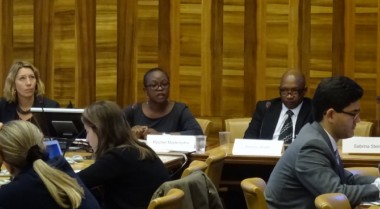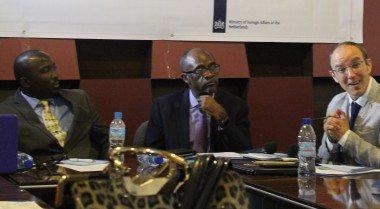
Geneva Peace week 2017
From 6-10 November, was the Geneva Peace Week. In its fourth edition, the Geneva Peace Week focused for the first time on the theme of Prevention and effective pathways for implementation. The theme built on the prioritization of prevention by United Nations Secretary-General António Guterres, who in his address to Members of the UN Security Council on 10 January 2017, said "Prevention is not merely a priority, but the priority. If we live up to our responsibilities, we will save lives, reduce suffering and give hope to millions." This week was an opportunity to see what the progress is towards conflict prevention and what can be done together with many various actors and organisations in this field.
GPPAC also participated in the event. Our Executive Director, Darynell Rodriguez Torres was a speaker on the panel during the launch event. Darynell Rodriguez Torres believes that, ‘The development of a strong constituency for prevention is one of the first steps to bridge the gap between rhetoric and practice. Identifying common goals and developing collaborations among different actors to achieve these goals are key elements to make prevention possible. A shared analysis and identification of risks by the different actors of prevention, (governments, multilateral organisations, private sector, academia, civil society organisations others) would contribute to forge collaborations and address social vulnerabilities that could lead to violence.'
'Any effort to do prevention must put people at the centre. It cannot be an ‘elitist' exercise but rather an inclusive effort to understand what are those elements that individuals and communities need in order to feel secure and how can we respond to those needs. The Global Partnership for the Prevention of Armed conflict, GPPAC, was founded to strengthen the constituency around prevention and to enable collaborations among different actors. We have shown a strong convening power and are in a unique position to bring the voices of grassroots actors to national, regional and global multilateral forums and make a significant contribution to managing the risk of violence outbreaks.'
GPPAC also held two workshops during the week. The first workshop, ‘Civil Society Perspectives: Obstacles and Opportunities to support the UN,' focused on The Civil Society-UN Prevention Platform. This platform was launched in 2016, in New York, in close collaboration with QUNO, GPPAC and the Department of Political Affairs with the aim to support the UN's prevention agenda through strengthening coordination and information sharing between civil society organizations (CSOs) and the UN at all levels. The Platform believes that the UN's work on prevention would benefit from a systematic engagement with civil society and that the inclusion of diverse civil society expertise is crucial to achieving sustainable peace. At the event, presenters highlighted the obstacles and opportunities for civil society to better support the UN's prevention agenda.
The second workshop, "Prevention in Practice: Case Studies in Prevention through a Sustaining Peace Lens," focused on the importance of locally led conflict prevention and peacebuilding strategies for it to be sustainable. This workshop brought the debates around sustaining peace and prevention to Geneva and highlighted the main discussions, challenges areas of thought and the key cases which highlight the various aspects of prevention for sustaining peace.

